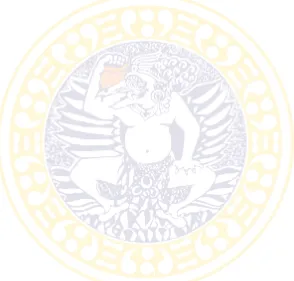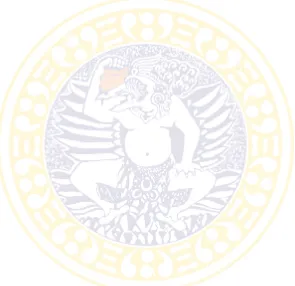BEING A KOREAN WOMAN: THE DEPICTION OF FEMININITY IN BEING A KOREAN WOMAN: THE DEPICTION OF FEMININITY IN
KOREAN TV DRAMA THE HEIRS
A THESIS
BY:
SHAFIRA BELLA NIM 121211231035
ENGLISH DEPARTMENT FACULTY OF HUMANITIES UNIVERSITAS AIRLANGGA
SURABAYA 2016
BEING A KOREAN WOMAN: THE DEPICTION OF FEMININITY IN KOREAN TV DRAMA THE HEIRS
A THESIS
Submitted as Partial Fulfillment of the Requirements for the Sarjana Degree of
English Department Faculty of Humanities
Universitas Airlangga Surabaya
BY:
SHAFIRA BELLA NIM 121211231035
ENGLISH DEPARTMENT FACULTY OF HUMANITIES UNIVERSITAS AIRLANGGA
iii
DECLARATION
This thesis is submitted as a partial fulfillment of the degree Sarjana
Humaniora (S.Hum.) of the English Department, Faculty of Humanities,
Universitas Airlangga. Hereby, I confirm the following points:
1. This thesis is entirely my own work.
2. It is not copied from any other person’s work (published or unpublished).
3. I do not use the services of any professional agencies to produce this
thesis.
4. It has not previously been submitted for assessment at either Universitas
Airlangga or elsewhere.
5. Any text, tables, figures, data or other material copied from other sources
(including, but not limited to, books, papers, and the internet) have been
clearly acknowledged and referenced in the text. These details are also
confirmed by a fuller reference in the references at the end of the text.
I understand that breaching any or all the above points will result in the
withdrawal of the awarded degree and disciplinary action in accordance with the
regulations at Universitas Airlangga.
Surabaya, December 30, 2015
v
Approved to be examined Surabaya, January 4, 2016
Thesis Advisor,
Diah Ariani Arimbi, Ph. D. NIP 197004051994032003
Head of English Department
Deny Arnos Kwary, Ph. D. NIP 197501011999031001
ENGLISH DEPARTMENT FACULTY OF HUMANITIES UNIVERSITAS AIRLANGGA
This thesis has been approved and accepted by the Board of Examiners, English Department, Faculty of Humanities, Universitas Airlangga
January 13, 2015
The Board of Examiners are:
Rina Saraswati, M. Hum. NIP 197805182007012002
Diah Ariani Arimbi, Ph. D. NIP 197004051994032003
vii
time, guidance and effort to help me through the completion of the thesis. Without
her endless encouragement and guidance, this research would not be done as the
way it was supposed to be. Thank you for enlightening me whenever I could not
seem to find the way. It has been a pleasant experience for me to be under her
supervision. I would also like to thank all of the lecturers in English Department
especially Mrs. Nurul Fitri Hapsari, M.A., as my academic advisor, and Mrs.
Arum Budiastuti, S.S, MCS., who always welcomes me with open arms whenever
I need her advice.
Special thanks to my mom, dad, and sisters whose support always gives
me a boost of spirit every single day. My simple ‘thank you’ would not be enough
to compensate all of the love they give to me. For my sister, Vina, thank you for
being the best sister and roommate, your ears must be tired listening to my
never-ending rants.
My partners in crime, Sandra W. Resti ‘Sandy’, Yunita Setyani ‘Ye’,
greatest friends ever although we have been through numerous ups and downs. I
really enjoy the time being with you girls, from our silly moments to the serious
ones (although it rarely happens). Best wishes on your theses and your future
venture. I hope we will stay in touch in the future. I love you guys!
My greatest thanks go to Mbak Angie for being my proofreader. You are
literally my savior. Lastly, my appreciation also goes to all my colleagues in
English Department class of 2012 who cannot be mentioned one by one. Thank
ix
고생끝에낙이온다
TABLE OF CONTENTS
Inside Cover Page ... i
Inside Title Page ... ii
Declaration Page ... iii
Dedication Page ... iv
Advisor’s Approval Page ... v
Examiner’s Approval Page... vi
Acknowledgements ... vii
Epigraph ... ix
Table of Contents ... x
List of Tables ... xiii
List of Figures... xiv
Abstract ... xvi
CHAPTER 1: INTRODUCTION 1.1 Background of the Study ... 1
1.2 Statement of the Problem ... 6
1.3 Objective of the Study ... 6
1.4 Significance of the Study ... 7
1.5 Definition of Key Terms ... 7
xi
2.1.1 Gender ... 9
2.1.2 Femininity ... 10
2.1.3 Feminine Traits ... 12
2.2 Review of Related Studies ... 16
CHAPTER 3: RESEARCH METHOD 3.1 Research Approach ... 21
3.2 Population and Sample ... 22
3.2.1 Variable of Traits ... 23
3.3 Data Source ... 24
3.4 Scope and Limitation ... 25
3.5 Technique of Data Collection ... 25
3.6 Technique of Data Analysis ... 26
CHAPTER 4: ANALYSIS 4.1 The Heirs: Story and Characters ... 28
4.1.1 Storyline ... 28
4.1.2 Main Characters ... 29
4.1.2.1 Park Shin Hye as Cha Eun Sang ... 29
4.1.2.2 Lee Min Ho as Kim Tan ... 29
4.1.2.3 Kim Woo Bin as Choi Young Do ... 29
4.1.3 Supporting Characters ... 30
4.1.3.1 Kim Ji Won as Yoo Rachel ... 30
4.1.3.2 Kang Min Hyuk as Yoon Chan Young ... 30
4.1.3.3 Krystal as Lee Bo Na ... 30
4.2 Feminine Characteristics ... 31
4.2.1 Personality ... 31
4.2.1.1 Affectionate ... 32
4.2.1.2 Modest ... 33
4.2.1.3 Talkative ... 34
4.2.1.4 Appreciative ... 34
4.2.1.5 Doubtful ... 34
4.2.1.6 Frivolous ... 35
4.2.1.7 Helpful ... 36
4.2.1.8 Nurturing ... 36
4.2.2 Emotion Traits ... 37
4.2.2.1 Dreamy ... 37
4.2.2.2 High-strung ... 38
4.2.2.3 Excitable ... 38
4.2.2.4 Fearful ... 39
4.2.2.5 Collapses Crying ... 39
4.2.2.6 Sensitive ... 40
4.2.2.7 Ashamed ... 41
4.2.3 Weak and Dependency Traits ... 42
4.2.3.1 Submissive ... 42
4.2.3.2 Passive ... 44
4.2.3.3 Fragile ... 44
4.2.3.4 Victim ... 45
4.2.3.5 Troublesome ... 45
4.2.3.6 Physically Weak... 46
4.2.4 Family Life Traits ... 47
4.2.4.1 Household Activities ... 47
4.2.4.2 Having a Family ... 48
4.2.4.3 Being in a Relationship ... 48
4.2.5 Tendency to Physical Appearance ... 49
xiii
4.2.5.2 Make-up ... 50
4.2.5.3 Wardrobe ... 50
4.2.5.4 Accessories ... 51
4.3 The Significant Aspects of Feminine Traits ... 52
4.4 The Heirs in South Korea and Indonesia Context ... 57
CHAPTER 5: CONCLUSION ... 67
WORKS CITED ... 70
LIST OF TABLES
Table 1. Feminine Traits………..………..………...24
xv
LIST OF FIGURES
Figure 1. Personality Chart………...31
Figure 2. Cha Eun Sang is hugging Kim Tan...……….…...33
Figure 3. Cha Eun Sang and Kim Tan are holding hands………..…...33
Figure 4. Kim Tan calls Cha Eun Sang “dummy”……….……...…35
Figure 5. Emotion Chart………...………...37
Figure 6. Cha Eun Sang is crying…………...………...………..39
Figure 7. Weak and Dependency Chart………....42
Figure 8. Kim Tan is reasserting his dominance..……….………43
Figure 9. Yoo Rachel is pulling Cha Eun Sang’s hair………..……....45
Figure 10. Cha Eun Sang is trying to push the car...……….………46
Figure 11. Family Life Chart………...……...47
Figure 12. Cha Eun Sang is hanging clothes...……….48
Figure 13. Tendency to Physical Appearance Chart………...49
Figure 14. Cha Eun Sang’s hair………....………..………..50
xvii ABSTRACT
Shafira Bella. Being a Korean Woman: The Depiction of Femininity in Korean TV Drama The Heirs. Undergraduate Thesis, Faculty of Humanities, Universitas Airlangga Surabaya.
As a form of media, Korean TV dramas become one of the most effective
instruments in constructing gender. The act of gender construction is reinforced
when a particular program is highly favored, just like how it works in The Heirs.
This study seeks to unveil how femininity is portrayed through the female
protagonist in a Korean TV drama, The Heirs, which mainly dwells on the issues
of love life of a rich heir who falls for a poor girl. This issue comes up due to
Confucianism values as determining influence of gender construction in South
Korea. The whole 20 episodes served as data with the length of each episode is
around 60 minutes. However, only the scenes depicting the female protagonist,
Cha Eun Sang, while performing feminine traits are coded. By conducting content
analysis, it is found that the frequency of Cha Eun Sang doing household works is
the highest. Hence, this study concludes that the representation of femininity in
this Korean TV drama affirms traditional gender roles by portraying the female
protagonist as being submissive, doing household activities, keeping her hair long,
affectionate and dream nothing but a prince charming. Cultural proximity between
cultures in South Korea and Indonesia is clear, instituting the idea of keeping
women within domestic sphere and obliged them to live a family-oriented life
while promoting patriarchy at the same time.

